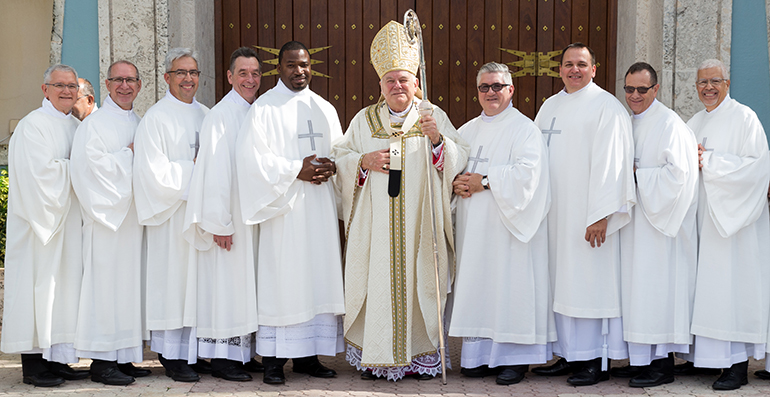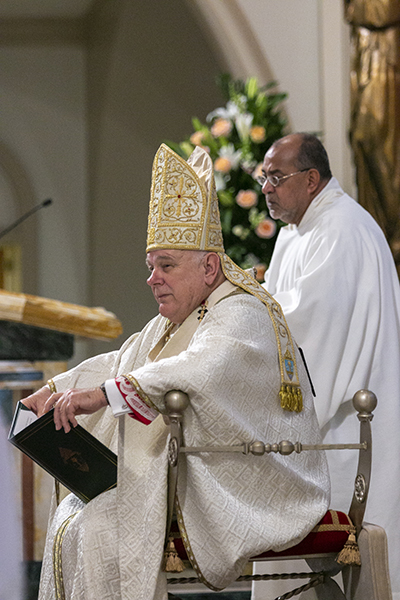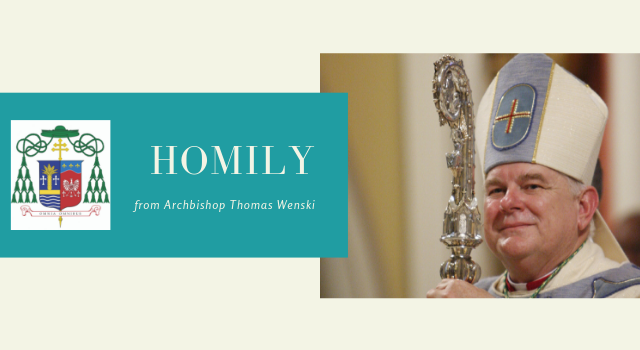By Archbishop Thomas Wenski - The Archdiocese of Miami

Photographer: TOM TRACY | FC
Newly ordained deacons pose for the official photo in front of St. Mary Cathedral, from left: deacons Jose Martinez, Luis Verdecia, Ernesto Sosa, Stephen Pyle, and Mesmin Augustin; Archbishop Thomas Wenski; and deacons Jorge Alvarez, Ismar Martinez; Jorge Matamala and Enrique Ferrer. Archbishop Thomas Wenski ordained nine more permanent deacons for the Archdiocese of Miami at St. Mary Cathedral, Dec. 14, 2019.
Archbishop Thomas Wenski preached this homily at the ordination of nine more permanent deacons for the Archdiocese of Miami, Dec. 14, 2019, in St. Mary Cathedral.
My dear friends, these nine men will receive the Sacrament of Holy Orders in the order of deacons through the “laying on of hands” – in the words of the Second Vatican Council – “not for the priesthood, but for the ministry. Strengthened by sacramental grace, they serve the People of God, in the diakonia of liturgy, word, and charity, in communion with the bishop and his presbyterate.” Lumen Gentium, 29
I want to thank the wives of these nine men for their permission allowing them to pursue this ministry and I thank them and their families for their continued support as these men assume their responsibilities as deacons of the Church. Quisiera agradecer a las esposas de estos hombres – gracias por haber dado su consentimiento, y gracias por su apoyo.
Mis hermanos, estos hombres serán diáconos de la Iglesia de Dios. Como tales, son ordenados para ser símbolo e instrumento de Cristo, quien vino “no para ser servido, sino para servir”.
Si podemos asociar las palabras “cristiano” y “ambición”, debe ser solamente cuando la “ambición cristiana” describe la pasión del cristiano para servir – ya que el “servicio” es la mayor vocación de cada cristiano.

Photographer: ANA RODRIGUEZ-SOTO | FC
Archbishop Thomas Wenski preaches the homily at the ordination Mass for nine more archdiocesan deacons, Dec. 14, 2019.
My brothers, you are ordained to be a sign and instrument of Christ who came, “not to be served but to serve.”For “service” is the highest calling of every Christian. Even the pope – who is the “highest” figure in the hierarchy of the Church – is rightly called: the Servus servorum Dei, the Servant of the Servants of God. As ordained deacons, you are to inspire, to promote and to help coordinate the service that the whole Church must undertake in imitation of Christ. Your diakonia or service is threefold: service of the Word, service of the Eucharist, and service of the poor.
Jezi ki remèt travay li nan men mesaje l yo ba yo pouvwa kreye mwayen ki nesesè pou Bon Nouvèl la kab gaye toupatou sou tè a, pou delivrans Jezi Kri kab rive nan lavi tout pitit Bondye yo. Nan premye tan Legliz la, mesaje Jezi yo te bezwen asosye pou ede yo okipe moun ki te malere, ki tap resevwa konkou nan men kominote a. Se nan sikonstans sa a, yo vin kreye wòl dyak yo. Pawòl “dyak” soti nan yon mo grèk ki vle di “sèvitè”. Konsa chak fwa Legliz ap sakre yon dyak se yon nouvo sèvitè li vle bay Pèp Bondye a.
Your diakonia or service is threefold: service of the Word, service of the Eucharist, and service of the poor.
First, the service of the Word: Today, I will entrust you with the Book of the Gospel with these words: Receive the Gospel of Christ, whose herald you have become.
Remember it is his Gospel, not yours; it is the Word of God we proclaim, not our own! As heralds, you must always speak in his name and not in your own. As ministers of the Church, your service must be service to the Truth revealed in the Word of God. Therefore, you must understand that it is the truth that judges events – not vice versa, as so often happens today in our current culture. By your faithful service to the Gospel in its integrity – without compromise, without accommodation, hesitation or fear – you must help the world to discover that Truth that has a human face, the Truth that is Jesus Christ.
Second, the service of the Eucharist: As deacons, you are the first co-workers of the priest in the celebration of the Eucharist.
All Christ’s faithful can come to a fuller and deeper understanding of and participation in the “mysteries of faith” if your service at the altar helps to underscore the “sacredness” of this sacramental encounter with the Living Christ. At the altar, your language, your demeanor must in no way be profane or given to an informal familiarity – for in this Holy Sacrifice we meet our Lord and Redeemer.
Yes, deacons assist at the altar; but, as Pope Francis recently said, deacons are not to be first class altar boys or second-class priests. You are called primarily to that other “service of the table” referred to in the Acts of the Apostles: the care of the orphans and widows.
And so, last but by no means least, the service of the poor must define what your diakonia means. As co-workers with the bishop and his priests, you must be the living and working expression of the charity of the Church. To you, then, is entrusted in a special way the ministry of charity that is at the origin of the institution of the deaconate. Through the ministry of her deacons, the Church can make herself present to the world of need and pain that otherwise might remain invisible to us. To the poor, speak of Christ, and offer them the Church’s assistance. And, at the same time, remind us that there, among the needy and the marginalized, lies the true treasure of the Church.
Legliz pa voye n fè travay pa n. Men, li voye n kontinye travay Jezi a. Poutèt sa, fò nou toujou rete tache tout tan sou Jezi pou ou kab fè sa Legliz ap tann nan men n nan, fò nou mache pye pou pye ak Jezi, pou nou kapab ede frè n ak sè n yo jwenn delivrans n ap chèche nou menm tou. Se ak lide sa a nan tèt nou, n ap pran angajman n ap pran nan.
Como diáconos, ustedes nacen del Altar – desde adentro del corazón del Sacrificio Eucarístico. El diaconado nace en oración. Y la oración – y solamente la oración – los sostendrá y los mantendrá fieles a su triple diaconía de la Palabra, la Eucaristía y la Caridad.
As this beautiful ordination ceremony so richly makes clear, as deacons, you are born from the Altar – from within the heart of the Eucharistic Sacrifice. You are born in prayer. And prayer – and only prayer – will sustain you and keep you faithful to your triple diakonia of Word, Eucharist and Charity.For this reason, I recommend to you, the Liturgy of the Hours. The Liturgy of the Hours is entrusted in a particular way to the ordained ministers of the Church. The Liturgy of the Hours belongs to you – no less than it belongs to the bishops and priests who are bound to it for their daily prayer.
As deacons you can also be instrumental in better acquainting the laity with the Liturgy of the Hours. And your own efforts to pray daily the Liturgy of the Hours can help you to grow in apostolic vigor, to be strengthened in faithfulness and thus to increase your ability to serve. And, since it is a prayer offered in the Spirit to the Father in the name of Christ for the Church and for the whole world, it is itself another form of diakonia.
Follow the example of the Lord himself: just as he himself has done, you also should do. Do God’s will from the heart: serve the people in love and joy as you would the Lord himself.

